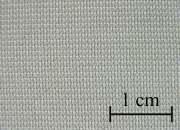Difference between revisions of "Tricot"
Jump to navigation
Jump to search
m (Text replace - "\[http:\/\/cameo\.mfa\.org\/materials\/fullrecord\.asp\?name=([^\s]+)\s(.*)\]" to "$2") |
|||
| Line 8: | Line 8: | ||
punto (Esp.) | punto (Esp.) | ||
| − | == | + | ==Resources and Citations== |
| − | M. Joseph, ''Introductory Textile Science'', Holt Reinhold & Winston, Fort Worth, 1986. | + | * M. Joseph, ''Introductory Textile Science'', Holt Reinhold & Winston, Fort Worth, 1986. |
[[Category:Materials database]] | [[Category:Materials database]] | ||
Latest revision as of 13:02, 16 June 2022
Description
A run-resistant warp-knit fabric. Tricot knitting was developed in England in 1775 by Crane. It is now the most common type of warp-knit fabric. It is made from synthetic (nylon, acetate, polyester, rayon, etc. ) and occasionally natural (Wool, Silk) fibers. Tricot knits are soft with good crease resistant and elasticity. They are used for clothing and lingerie.
Synonyms and Related Terms
punto (Esp.)
Resources and Citations
- M. Joseph, Introductory Textile Science, Holt Reinhold & Winston, Fort Worth, 1986.
